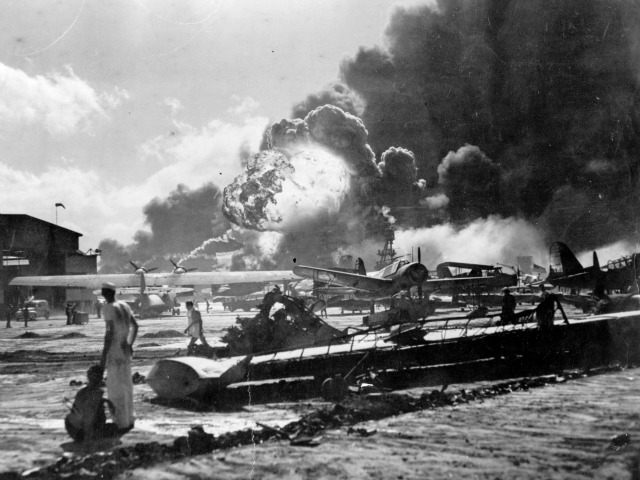Today marks the 74th anniversary of the Japanese attack on Pearl Harbor—one of the most stunning American military catastrophes in this country’s history and a moment that signaled a new era for the republic. The casualties were stunning—2,042 Americans were killed and 1,247 wounded, and most of the Pacific Fleet has taken heavy damage—the nation was in a state of shock.
According to historian Max Hastings, in seeing the wreckage of Pearl Harbor in the aftermath of the attack, one sailor said:
We were flabbergasted by the devastation… The water was covered with oil, fires were burning still, ships were resting on the bottom mud, superstructures had broken off and fallen. Great gaps loomed where magazines had exploded, and smoke was roiling up everywhere. For sailors who had considered these massive ships invincible, it was a sight to be seen but not comprehended… We seemed to be mourners at a spectacular funeral.
Many Americans were justifiably afraid as it was clear the country was being drawn into a worldwide conflict that had already devastated Europe and countries across the globe. But fear quickly turned to anger and Americans looked to their president for leadership as the United States entered World War II.
In the wake of this incredible blow to the American military, national pride and the sudden, unbelievable loss of life, President Franklin Roosevelt wasted no time and decided to immediately call for a declaration of war. Just a day later, he delivered his most famous “Day of Infamy” speech. Roosevelt began his six-minute speech with words that should be familiar to every American, “Yesterday, Dec. 7, 1941—a date which will live in infamy—the United States of America was suddenly and deliberately attacked by naval and air forces of the Empire of Japan.”
FDR was unequivocal about the enemy the nation faced, assured in the injustice of the attack, and was utterly resolved to use all of his powers as commander-in-chief to bring justice to the Japanese enemy. He called on the American people to unite and prepare for a long and difficult fight against a powerful foe that threatened the American way of life. He called on the nation to weaponize the Arsenal of Democracy and fight until absolute victory was achieved.
“No matter how long it may take us to overcome this premeditated invasion, the American people in their righteous might will win through to absolute victory,” Roosevelt said. “I believe I interpret the will of the Congress and of the people when I assert that we will not only defend ourselves to the uttermost, but will make very certain that this form of treachery shall never endanger us again. Hostilities exist. There is no blinking at the fact that that our people, our territory and our interests are in grave danger.”
Before officially calling for a declaration of war, the president expressed absolute conviction in the American people by saying, “With confidence in our armed forces—with the unbounding determination of our people—we will gain the inevitable triumph—so help us God”
This is the speech of a leader demonstrating solidarity with his people and giving them a clear picture of what they have to do to defeat an enemy of the whole country.
Today, Americans are confronted with a new enemy. Not a nation with defined borders, diplomats, armies, and heads of state, but a creed that is pitted against civilization and aims to draw the world into a new dark age. On September 11, 2001 it was clear that this enemy threatened American civilization and that it was earnest in its aim to bring absolute devastation to the American people. In the long war between civilization and radical Islam, two terrorists butchered American citizens en masse in San Bernardino, California.
After initially dismissing the brutal killings as possibly “workplace-related” violence, President Obama finally addressed the nation in a televised speech from the Oval Office on Sunday night. Though the president said that the attacks were “an act of terrorism designed to kill innocent people,” there were few calls to be resolute to destroy a common, merciless, evil foe, and no new measures were offered to defeat this enemy. Instead, President Obama called for Republicans to cut out the “tough talk,” and be “smart” in reaction to the horrific killings. He said the country must be wary of being drawn into a “long and costly ground war in Iraq or Syria.”
The one major, concrete idea that Obama proposed was to pass more widespread gun control. He said that America needs to “make it harder for people to buy powerful assault weapons, like the ones that were used in San Bernardino.” California has some of the most stringent gun laws in the country, and the two San Bernardino jihadists were able to obtain powerful weapons legally and despite the laws.
It is clear that America’s enemy is not just in a far off land with vast oceans to separate us from them. The enemy is finding ways to infiltrate the country and bring jihad to our doorsteps. Rather than disarm, American’s are voting with their feet and wallets, buying up guns in record-breaking numbers to protect themselves, their families, and their communities.
Seventy-four years ago, President Roosevelt calmed the nation’s fears with obvious resolve and lead the country into the greatest war in world history. Regardless of differences with domestic political opponents, FDR put policy quibbles aside to lay out a plan to defeat an enemy that threatened the existence of the United States and the free world. In the long war against radical Islam—the greatest ideological challenge to the United States since the Cold War—Americans are now left to look to themselves for defense, not their government or their leaders.
Follow Jarrett Stepman on Twitter:@JarrettStepman. Reach him directly at jstepman@breitbart.com.

COMMENTS
Please let us know if you're having issues with commenting.